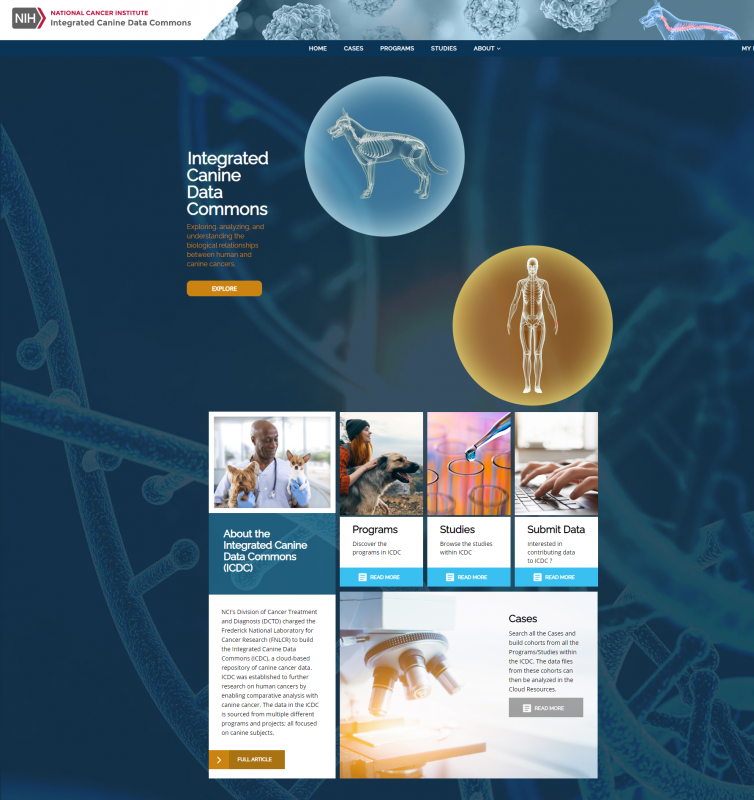Cancer Data Science Pulse
Integrated Canine Data Commons: Using Comparative Oncology to Advance Translational Research
One of the greatest obstacles in moving a new drug candidate or therapy from basic discovery to its successful clinical application is our inability to rapidly evaluate its efficacy so that we can prioritize the most promising treatments for clinical development.
Today, we are amassing large amounts of research data, giving us new methods to overcome this hurdle and to make the process between drug discovery and clinical application more efficient. NCI’s Center for Biomedical Informatics and Information Technology (CBIIT) is leading the development of an extensive data science infrastructure—collectively called the Cancer Research Data Commons (CRDC)—aimed at achieving this goal. These repositories include a broad range of multi-omics (genomics and proteomics), imaging, and clinical data from cancer patients. Using these data, researchers can examine how well patients respond to candidate drugs and therapies. Moreover, they can map these clinical responses to genetic information on specific individuals to see if some people respond better to certain treatments. This is at the heart of precision medicine—targeting the right treatment to the right patient at exactly the right time.
The science does not stop at humans. Researchers recognized decades ago that naturally occurring cancers in dogs can be similar to those that occur in humans. Moreover, the Canine Genome Sequencing Project revealed that dog and human genomes share a majority of genes, providing further evidence that dogs are a valuable resource for studying the genetic basis of complex human diseases like cancer. The concept of comparative oncology has entered a new era as dogs, just like their human counterparts, can participate in clinical trials and receive the latest in medications and novel therapeutics. Comparative oncology provides an opportunity for early assessment of drug activity and toxicity to better inform future veterinary and human clinical trials. NCI’s goal is to help humans and canines live longer, healthier lives.
The Integrated Canine Data Commons (ICDC)
To further advance this comparative oncology research approach, the NCI’s Division of Cancer Treatment and Diagnosis (DCTD) has launched three initiatives to expand the value, use, and impact of spontaneously-arising cancer in pet dogs. These initiatives include: grant supplements to support research to sequence canine cancers; grants to study immunotherapeutic agents and novel drug combinations in canine cancer clinical trials, such as those coordinated by the PRE-medical Cancer Immunotherapy Network Canine Trials (PRECINCT); and establishing the Integrated Canine Data Commons (ICDC).
The ICDC is a cloud-based repository of canine cancer data that allows researchers to store, access, and analyze data to advance canine cancer research. Moreover, because the ICDC is part of the larger CRDC ecosystem, researchers will have the opportunity to compare their results within the ICDC, and to combine and analyze data from other repositories, such as the Genomic Data Commons (GDC), to further relate their findings on canine cancer to those of humans. This integrative approach will be enhanced by a new Cancer Data Aggregator (CDA) to allow scientists to crosstalk among the very diverse data sets within the CRDC. Researchers soon will be able to link to data on genomics, proteomics, single-cell, radiology, molecular imaging, clinical findings, and more. With its connection to the NCI Cloud Resources, ICDC researchers will be able to leverage more than 1,000 analytical tools and pipelines for high-powered cloud computing and analysis.
The ICDC is actively collecting data sets from veterinary hospitals, research institutions, and NIH-sponsored studies on companion dogs with cancer. These data include molecular, clinical, pharmacological, and medical imaging information.
Most importantly, the ICDC features data on treatment efficacy, including what therapies were used, such as immunotherapy, chemotherapy and radiation, and their outcomes. Such outcome data not only will allow us to refine the best therapies in use today, but also will help to identify new drugs or compounds that are showing potential for treatment, further speeding the process of drug development. Researchers can map this clinical information against what’s known about the dog’s genome and immune system. Together, this gives us a greater understanding of these cancers—and how to treat them—in dogs and in people.
To explore ICDC’s canine cancer data, visit caninecommons.cancer.gov.
Categories
- Data Sharing (66)
- Informatics Tools (42)
- Training (40)
- Precision Medicine (36)
- Data Standards (36)
- Genomics (36)
- Data Commons (34)
- Data Sets (27)
- Machine Learning (25)
- Artificial Intelligence (25)
- Seminar Series (22)
- Leadership Updates (14)
- Imaging (13)
- Policy (10)
- High-Performance Computing (HPC) (9)
- Jobs & Fellowships (7)
- Semantics (6)
- Funding (6)
- Proteomics (5)
- Information Technology (4)
- Awards & Recognition (3)
- Publications (2)
- Request for Information (2)
- Childhood Cancer Data Initiative (1)


Leave a Reply